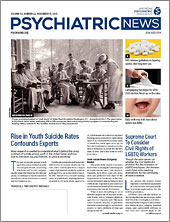In October the Department of Health and Human Services (HHS) published its “Guide for Clinicians on the Appropriate Dosage Reduction or Discontinuation of Long-Term Opioid Analgesics.” The guide, available as a PDF for download, offers evidence-based pointers and clinical pearls for determining which patients could benefit from reducing or tapering off opioid pain medications after long-term use and how to help them through the process.
The guide also includes the DSM-5 criteria for opioid use disorder, emphasizes the importance of providing behavioral health support and encourages health care professionals to collaborate with mental health professionals and other specialists as needed.
“Psychiatrists, as physicians and mental health specialists, are best suited to provide care for the whole patient throughout the tapering process and, if necessary, through diagnosis and treatment of opioid use disorder,” said APA CEO and Medical Director Saul Levin, M.D., M.P.A. “We welcome the opportunity to offer our expertise and are ready to answer questions, address concerns, and work together with both patients and health care professionals to ensure that patients receive the comprehensive care they need.”
“Taking patients abruptly off high doses of opioid pain medication can cause negative consequences, including opioid withdrawal,” said Elinore McCance-Katz, M.D., Ph.D., assistant secretary for mental health and substance use and head of the Substance Abuse and Mental Health Services Administration. “These guidelines offer an evidence-based approach to opioid tapering in a safe and effective manner for patients. Psychiatrists can play a key role because they have specialized training in this area that they can offer to their primary care colleagues.”
The guide features a flowchart to help health professionals navigate the opioid tapering process and provides the following information:
•
Considerations for deciding when to taper.
•
Important steps to take before initiating a taper.
•
Tips on shared decision making with patients.
•
Pointers on individualizing taper rates.
•
Background on opioid withdrawal.
•
Ways of providing behavioral health support.
•
Guidance on what to do when patients are unable or unwilling to taper.
The guide also includes links to helpful resources such as the Substance Abuse and Mental Health Services Administration’s Buprenorphine Practitioner Locator and Opioid Treatment Program Directory. ■
“HHS Guide for Clinicians on the Appropriate Dosage Reduction or Discontinuation of Long-Term Opioid Analgesics” is posted
here.

